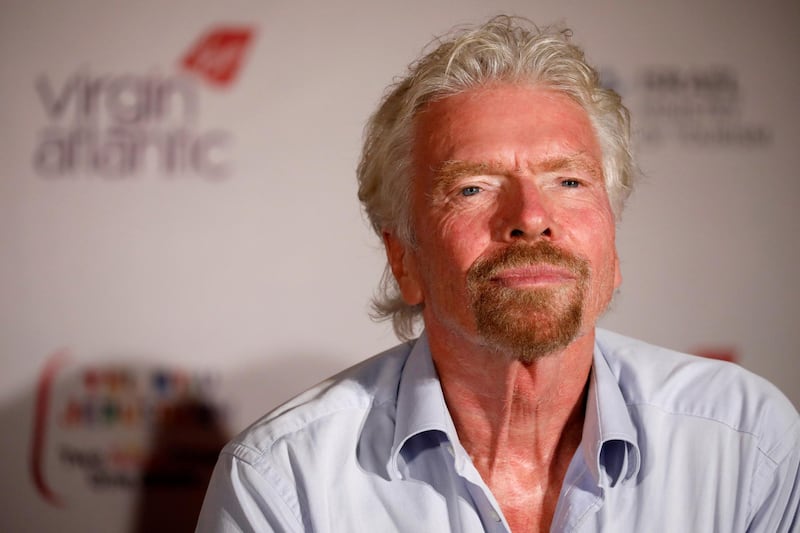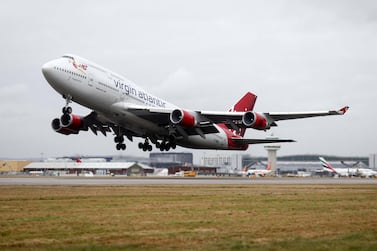Covid-19 is exacting a heavy financial toll on one of the world’s most-recognisable entrepreneurs.
Richard Branson already has pledged a Caribbean island and at least $250 million (Dh918m) to shore up a leisure and travel empire roiled by the coronavirus pandemic. Now he’s selling a chunk of his stake in Virgin Galactic Holdings, his most valuable listed asset, to raise as much as $500m.
Over the past half century, Mr Branson built Virgin Group into a sprawling collection of businesses with annual revenues exceeding $20 billion. But his practice of plunging most of the profits back into the ventures has left him scrambling for cash as governments shirk from bailing out a billionaire famous for his flamboyant publicity stunts.
“He’s made a career for himself as the ultimate disruptor,” said David Hawkins, co-founder of family business consulting firm Percheron Advisory. “But now he’s faced with a disruptive world and, ironically, it’s not working for him right now. He’s again got to get ahead of the curve.”
Virgin Group spokesman Nick Fox said the Virgin Galactic stake held by investment company Vieco 10 could fall below 50 per cent, depending on the size of the offering. Virgin Group owns 81 per cent of Vieco 10, with the balance held by Aabar Space, an Abu Dhabi investment company. Virgin Galactic chief executive George Whitesides declined to comment.
Mr Branson, 69, isn’t alone. The market plunge triggered by the spread of the coronavirus has put pressure on wealthy families worldwide, with some facing margin calls this year on share-backed debt facilities.
Still, his are particularly high-profile struggles. Over the years, Mr Branson has attempted world records, drove a tank down New York’s Fifth Avenue and leapt from the roof of a Las Vegas casino wearing a black suit and harness to launch one of his airlines.
Few industries have been hit harder.
Virgin’s Australian airline is in administration, and Virgin Atlantic Airways is courting potential investors to avoid a similar fate. Just last year, Virgin Atlantic’s future seemed so promising that Mr Branson scrapped the sale of a 30 per cent stake to Air France-KLM in favor of retaining control.
“Because many of our businesses are in industries like travel, leisure and wellness, they are in a massive battle to survive and save jobs,” Mr Branson said in a March blog post.
Virgin Galactic started trading publicly last year after merging with US investment firm Social Capital Hedosophia. Mr Branson will still have a stake worth more than $1bn in the space-travel company even if he sells the maximum proposed amount disclosed on Monday.
His net worth has dropped 12 per cent this year to $5.1bn, according to the Bloomberg Billionaires Index, a ranking of the world’s 500 richest people. Mr Branson’s other assets include a $169 million stake in Virgin Money UK, a Swiss ski chalet in Verbier and an African game preserve.
Living in the British Virgin Islands – where residents pay no income or capital-gains taxes – hasn’t helped Branson in his bid for a bailout from the UK government. He said he bought his Caribbean island at age 29 because of his love of the locale and not for tax reasons.
“Happy to hear [Mr] Branson is putting his hand in his own pocket rather than our tax coffers,” Labour Party MP Margaret Hodge said Monday in a tweet.







